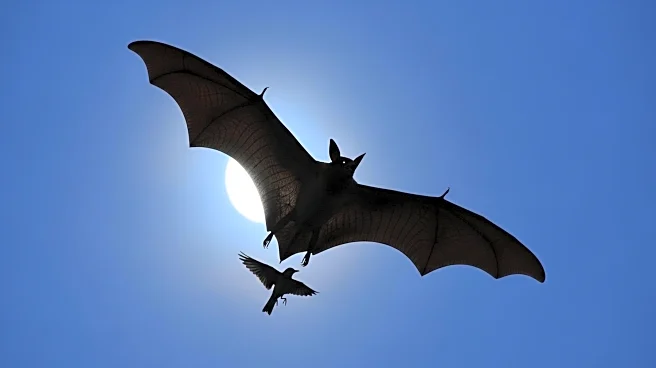What is the story about?
What's Happening?
An international research team has uncovered the hunting techniques of Europe's largest bat, the greater noctule, which captures and consumes small birds mid-air. The study, published in Science, reveals that these bats hunt more than a kilometer above the ground, using biologgers to track their movements and echolocation calls. The bats pursue their prey in steep dives, similar to fighter aircraft, and can detect birds at significant distances due to their loud ultrasound calls. The research involved equipping bats with tiny 'backpacks' containing biologgers developed at Aarhus University, which recorded their hunting behavior in detail.
Why It's Important?
This discovery provides crucial insights into the nocturnal predation strategies of bats, highlighting their ability to catch and consume birds while flying. The greater noctule's hunting behavior has implications for understanding bat ecology and designing conservation strategies, as this species is rare and endangered due to habitat loss. The study also challenges previous skepticism about bats' ability to hunt birds in flight, offering new perspectives on predator-prey dynamics in nocturnal environments. Understanding these interactions is vital for biodiversity conservation and ecosystem management.
What's Next?
The findings may lead to further research on bat conservation, particularly focusing on habitat preservation and management strategies to protect the greater noctule. Researchers might explore the impact of these bats on songbird populations, although current evidence suggests minimal threat due to the bats' rarity. Conservationists could use this information to advocate for policies that safeguard forest habitats, ensuring the survival of both bats and their prey. Additionally, advancements in biologger technology could facilitate more detailed studies of other nocturnal predators.
Beyond the Headlines
The study raises ethical considerations regarding the balance between predator and prey in natural ecosystems. While the predation of songbirds by bats is a natural phenomenon, it underscores the complexity of ecological interactions and the need for comprehensive conservation approaches. The research also highlights the innovative use of technology in wildlife studies, paving the way for future explorations of animal behavior in challenging environments.
















